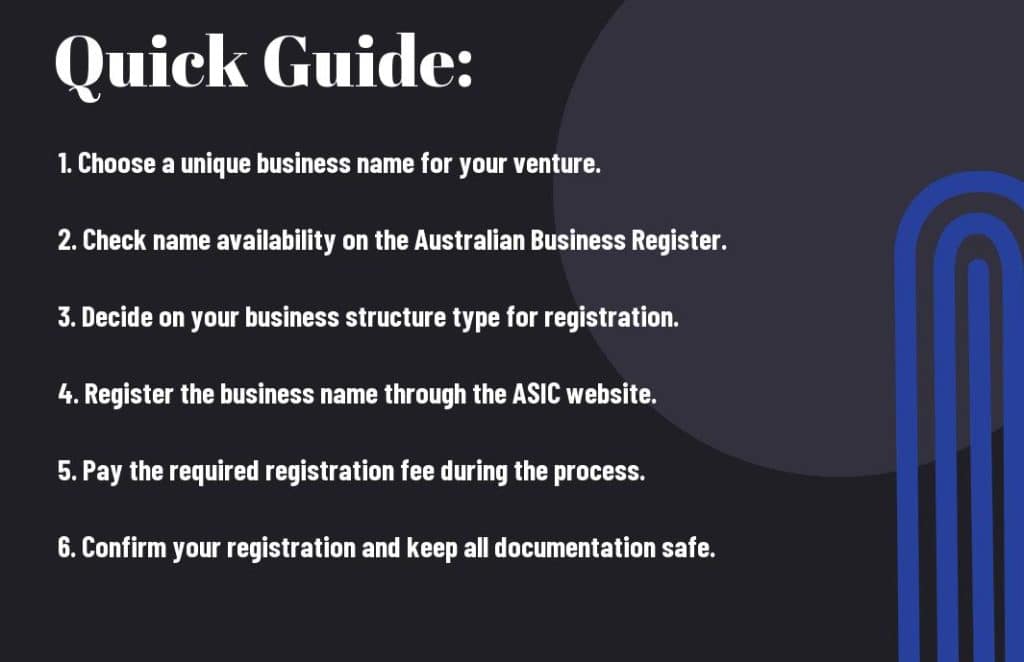How do I register my business name in Australia?
Just starting your own business in Australia? One of the first steps you need to take is to register your business name. This process not only helps protect your brand identity but also ensures you’re compliant with Australian regulations. In this guide, you’ll learn about the necessary steps, requirements, and tips to successfully register your business name, enabling you to focus on growing your venture.
Key Takeaways:
- Choose a unique name: Ensure your business name is not already in use or registered by another entity to avoid legal issues.
- Register with ASIC: Use the Australian Securities and Investments Commission (ASIC) website to formally register your business name.
- Consider trademarking: If your business name has significant value, consider applying for a trademark to protect your brand identity.

Types of Business Names in Australia
Australia offers a variety of business name options to cater to different needs. Understanding these types can help you choose the right one for your venture. Here are the key categories of business names:
| Type | Description |
|---|---|
| Registered Business Name | A name registered with the Australian Securities and Investments Commission (ASIC). |
| Trade Mark | Protected branding that distinguishes your goods and services. |
| Domain Name | The address for your online presence. |
| Company Name | Name under which your company operates legally. |
| Business Trading Name | Name you choose to trade under, which may differ from your registered name. |
Knowing the types of business names can guide you in making an informed decision for your entrepreneurial journey.
Registered Business Names
An Australian registered business name is crucial for operating legitimately. This name is uniquely identifiable and needs to be registered with ASIC if you are trading under a name that is not your personal name. It helps in building your brand while ensuring compliance with local regulations.
Trade Marks
Names can also be protected through trade marks, which legally safeguard your brand identity. A trade mark ensures that your unique business name, logo, or slogan cannot be used without your permission. This protection adds value to your brand and prevents potential disputes over trademark infringement.
With trade marks, you not only protect your intellectual property but also enhance your business’s market presence. Securing a trade mark may seem like an extra step, but the benefits far outweigh the costs, especially when it comes to establishing credibility and trust with your customers.
Step-by-Step Guide to Registering Your Business Name
The process of registering your business name in Australia can be straightforward if you follow the right steps. Below is a comprehensive guide laid out in a simple format to assist you through the registration journey.
| Steps | Details |
|---|---|
| 1. Choose Your Business Name | Ensure your name reflects your business and is unique. |
| 2. Check Name Availability | Use ASIC’s business name register to see if your name is available. |
| 3. Gather Required Documents | Collect your identification and any other required details. |
| 4. Complete the Application | Fill out the online application form on the ASIC website. |
| 5. Pay the Registration Fee | Make the necessary payment to finalize your registration. |
Pre-registration Considerations
There’s a handful of factors you should review before registering your business name. Think about your target audience and how your name resonates with them. It’s also imperative to consider the availability of your preferred name on social media platforms and domain names to ensure consistency across your brand’s online presence.
Registration Process
Name registration begins by choosing a unique business name that represents your brand. Once you have a name in mind, you can search for its availability on the ASIC website. After confirming that your selected name isn’t already in use, you will proceed to fill out the application form with required personal identification. Ensure you understand the fees involved before making your payment, as this completes the registration process.
Registering your business name is beneficial for legal protection and establishing credibility. After you’ve successfully submitted your application and payment, you’ll receive confirmation. It’s advisable to keep this information on hand as you may need it for ongoing compliance and future business activities. Once registered, your business name will be valid for three years, after which you’ll need to renew it to maintain your rights to its exclusive use.

Factors to Consider When Choosing a Business Name
Despite the excitement of starting your business, selecting a name requires thoughtful consideration. Here are some factors to keep in mind:
- Relevance to your products/services
- Uniqueness in your industry
- Easy to spell and pronounce
- Available as a domain name
- Positive connotations and impressions
Assume that your business name will be the first impression you make on potential customers, so choose wisely.
Relevance and Uniqueness
You should ensure your business name reflects your offerings while standing out. A relevant name helps potential customers easily identify what you do, while uniqueness prevents confusion with competitors and aids in brand recognition.
Compliance with Australian Laws
Some key legal considerations must be addressed when choosing your business name. This includes checking for existing trademarks, ensuring your name doesn’t mislead consumers, and verifying its availability for registration.
When identifying a business name, it’s vital to conduct thorough research on trademark databases and the Australian Securities and Investments Commission (ASIC) to confirm that your preferred name isn’t already in use. Additionally, avoid names that can be deemed offensive or misleading as these can lead to legal complications. Being compliant not only protects your business but also cultivates trust with your customers.
Pros and Cons of Registering a Business Name
To decide whether registering your business name is right for you, it’s imperative to weigh the benefits and disadvantages. The following table outlines the various pros and cons associated with business name registration.
| Advantages | Potential Drawbacks |
|---|---|
| Protects your business identity | Costs associated with registration |
| Builds credibility with customers | Ongoing compliance requirements |
| Access to business bank accounts | Possibility of name disputes |
| Increases brand recognition | Limited protection for your name |
| Required for certain business structures | Time-consuming application process |
Advantages of Registration
One of the primary advantages of registering your business name is that it provides legal protection, helping to safeguard your brand identity from competitors. Additionally, having a registered name enhances your company’s credibility and professionalism, making it easier to build customer trust. This legitimacy also opens doors for business banking and financing opportunities.
Potential Drawbacks
Any potential drawbacks include the costs associated with registration as well as ongoing compliance obligations that you must fulfill. These requirements may take up time and resources that could be directed elsewhere in your business.
Drawbacks may also arise from the limited protection that a registered business name offers. While registration prevents others from using your specific name, it does not provide exclusive rights to the name or prevent others from registering similar names. Additionally, you might face disputes if another entity claims your name infringes upon their brand. Thus, it’s vital to conduct thorough research before registration.
Tips for a Successful Business Name Registration
Unlike what many believe, registering your business name involves more than just filling out forms. To enhance your chances of a smooth registration process, consider the following tips:
- Choose a name that reflects your brand identity.
- Check for existing trademarks.
- Keep it simple and memorable.
- Ensure the name is not similar to competitors.
This approach will help set the foundation for your business identity.
Conducting Thorough Research
The key to a strong business name is thorough research. You need to verify that your chosen name isn’t already in use by another company, which could lead to potential legal conflicts. Utilize online databases and search engines to check for existing businesses, trademarks, and domain availability to ensure your name stands out and is legally allowable.
Seeking Professional Advice
Successful business name registration can be greatly enhanced by seeking professional advice. Consulting with a legal expert or business advisor can help you navigate the complexities involved in the registration process, including trademarking and compliance with regulations.
Plus, these professionals can provide insights about potential pitfalls and assist in crafting a name that aligns with your overall business strategy. By enlisting their expertise, you can save time, avoid costly mistakes, and ensure your business name is both unique and compliant with Australian laws.
Common Mistakes to Avoid
Keep in mind that registering your business name requires careful attention to detail. Many entrepreneurs make avoidable errors that can lead to complications later. Ensure you double-check all information and follow the correct procedures to save time and resources.
Ignoring Name Availability
Common mistakes include failing to check if your desired business name is already taken or too similar to existing names. Conducting a thorough search on the Australian Securities and Investments Commission (ASIC) website is necessary to avoid potential legal disputes and to ensure your business name stands out in the market.
Overlooking Legal Obligations
Legal compliance is vital for your business’s integrity. Failing to familiarize yourself with the relevant laws and regulations surrounding business name registration may result in penalties or complications with your operation.
Name registration in Australia isn’t just about securing a catchy title; it involves understanding your legal responsibilities. You should verify if your chosen name complies with the Business Names Registration Act and ensure you do not infringe on any trademarks. Moreover, registering your name does not automatically grant you copyright or trademark protection, so you may need to explore additional steps to safeguard your brand effectively.
Summing up
Upon reflecting, registering your business name in Australia involves several straightforward steps. You start by checking the availability of your desired name through the Australian Securities and Investments Commission (ASIC) website. Next, you can complete the registration process online, providing the necessary details and paying the applicable fees. It’s important to keep your registration current by renewing it as needed. By following these guidelines, you enhance your business’s credibility while ensuring compliance with Australian regulations.
FAQ
Q: What steps do I need to take to register my business name in Australia?
A: To register your business name in Australia, you need to follow a few key steps. First, determine the type of business structure you will be using (e.g., sole trader, partnership, company). Next, check the availability of your desired business name using the Australian Securities and Investments Commission (ASIC) business name register. If the name is available, you can complete the registration online via the ASIC website or through a registered service provider. You will need to provide your personal information, the proposed business name, and pay the registration fee. The business name is usually registered for one or three years, after which you will need to renew it.
Q: Do I need to register my business name if I operate under my own name?
A: If you are conducting business using your own name (e.g., John Smith Plumbing), you are not required to register a business name. However, if you choose to operate under a different name (e.g., Smith’s Plumbing Services), you will need to register that name with ASIC. Additionally, if your business structure is a partnership or a company, you will also need to register the business name, regardless of whether it is your own name or not.
Q: What are the costs associated with registering a business name in Australia?
A: The costs for registering a business name in Australia can vary based on the duration of the registration. As of 2023, the registration fee for a business name is typically around AUD 37 for one year and AUD 87 for three years. It’s important to check the ASIC website for the most current fees. Additional costs may arise if you choose to engage a professional service for assistance or if you require additional licenses and permits depending on your business activities.








